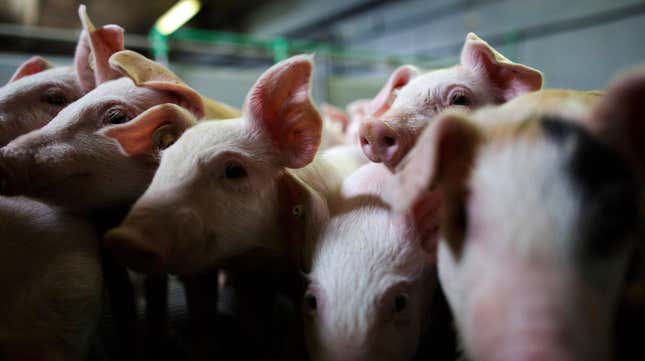
Scientists look to be one major step closer to a long-awaited goal in medicine: successfully transplanting organs from another animal to a human. Researchers from New York University announced this week that they recently transplanted a kidney from a genetically modified pig that was then able to function as normal without rejection from the human body. Though there are possible ethical and safety concerns about the use of these nonhuman organs, experts hope that this technology will one day save the lives of many left languishing on backlogged transplant lists.
Researchers at NYU Langone Health conducted the operation last month, as first reported by USA Today. For ethical reasons, they performed it on a brain-dead patient whose family agreed to help, since the patient was supposed to be taken off life support soon anyway. The group transplanted the porcine kidney to the patient, then watched the organ for two days before the study ended. During these days, the kidney seemed to work perfectly well as intended.
“It had absolutely normal function,” Robert Montgomery, lead of the NYU surgical team, told the AP. “It didn’t have this immediate rejection that we have worried about.”
Earlier last winter, the Food and Drug approved the use of the pig used in this research, developed by United Therapeutics Corp, as both a food and medical product. Beyond the organs they may provide, there’s hope that they could be used to help develop other biological products like blood thinners. But there are more regulatory hurdles that have to be climbed, including evidence of its continued safety, before pig organs will be seen as a viable alternative to human ones for transplantations. Importantly, the research conducted by the NYU team has yet to be published in a peer reviewed journal, which is a key part of the scientific process.
The prospect of animal-to-human transplantation, also known as xenotransplantation, has been a dream for centuries, though the first serious attempts at it likely occurred in the early 20th century. While we’ve long relied on some biological products that are safely derived from other animals, including insulin, xenotransplantation itself remains elusive.
The largest barrier to xenotransplantation has been incompatibility. The human body fiercely rejects the presence of cells that don’t exactly resemble it, which makes even human-to-human transplantation tricky. Potential donors are chosen to be as close as possible to their recipient, both in terms of genetics and blood type, while recipients need to take immunosuppressants to keep the odds of rejection low. This problem is only compounded when you try to move across the species barrier.
In the past, scientists have tried to use the organs of fellow primates to avoid rejection. But for various reasons, including the rarity of these animals, that hasn’t panned out. More recently, there have been efforts to use pigs that are genetically engineered to have organs that more closely resemble human ones. Using techniques like CRISPR, for instance, scientists can now knock out genes in pigs’ cells that quickly trigger the human immune system (one important change is that they no longer make a sugar that we don’t produce, called alpha-gal). Researchers can also inactivate ancient viruses that long ago became part of pigs’ genome, hopefully eliminating the risk of some dormant infection resurrecting in the donor. And now, we’re finally at the stage where real live human tests of these organs are being performed.
Some surveys have indicated that the general public and doctors would support xenotransplantation if it became available, though these polls are decades old. Provided these organs are viable and safe, they may save thousands of lives a year in the U.S. alone, since up to 17 Americans die every day while waiting for an organ.